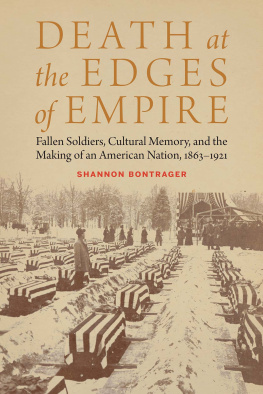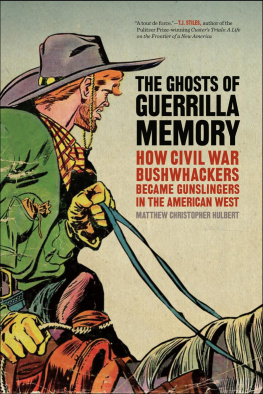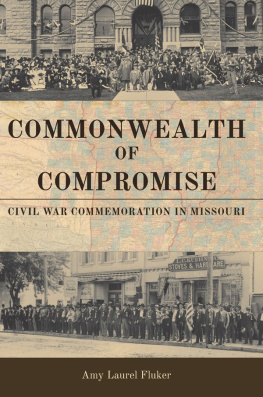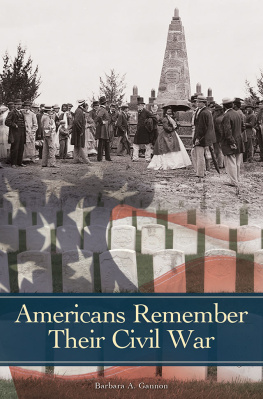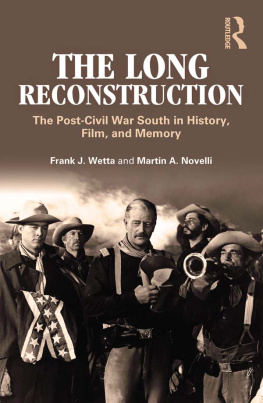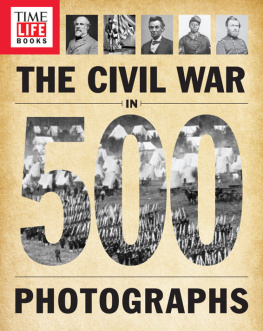The Civil War in Popular Culture
The Civil War in
Popular Culture
Memory and Meaning
Edited by
Lawrence A. Kreiser Jr.
and
Randal Allred

Copyright 2014 by The University Press of Kentucky
Scholarly publisher for the Commonwealth,
serving Bellarmine University, Berea College, Centre College of Kentucky, Eastern Kentucky University, The Filson Historical Society, Georgetown College, Kentucky Historical Society, Kentucky State University, Morehead State University, Murray State University, Northern Kentucky University, Transylvania University, University of Kentucky, University of Louisville, and Western Kentucky University.
All rights reserved.
Editorial and Sales Offices: The University Press of Kentucky
663 South Limestone Street, Lexington, Kentucky 40508-4008
www.kentuckypress.com
18 17 16 15 14 5 4 3 2 1
Library of Congress Cataloging-in-Publication Data
The Civil War in popular culture : memory and meaning / edited by Lawrence A. Kreiser Jr. and Randal Allred.
pages cm
Includes bibliographical references and index.
ISBN 978-0-8131-4307-1 (hardcover : alk. paper) ISBN 978-0-8131-4322-4 (pdf) ISBN 978-0-8131-4321-7 (epub)
1. United StatesHistoryCivil War, 1861-1865. 2. United StatesHistoryCivil War, 1861-1865Battlefields. 3. United StatesHistoryCivil War, 1861-1865Literature and the war. 4. United StatesHistoryCivil War, 1861-1865Motion pictures and the war. 5. Collective memoryUnited States. 6. Popular cultureUnited States. I. Kreiser, Lawrence A., 1969- editor of compilation. II. Allred, Randal, 1956- editor of compilation.
E468.9.C4746 2014
973.7dc23 2013033128
This book is printed on acid-free paper meeting the requirements of the American National Standard for Permanence in Paper for Printed Library Materials.

Manufactured in the United States of America.

| Member of the Association of
American University Presses |
Contents
Lawrence A. Kreiser Jr. and Randal Allred
Michael W. Schaefer
Brian Craig Miller
Daryl Black
Robert E. Weir
Susan Chase Hall
Jacqueline Glass Campbell
Matthew Eng
Daniel W. Stowell
Paul Haspel
Alfred Wallace
Christopher Bates
David Madden
Introduction
Lawrence A. Kreiser Jr. and Randal Allred
Perhaps no other event has captured the national imagination to the extent the Civil War has. Portrayals of the war in songs, books, and movies, among other cultural and media outlets, continue to draw widespread attention. Gone with the Wind, the 1939 epic that follows Scarlett OHara through the tragedies and triumphs of the Civil War era, remains one of the top-grossing and most influential films of all time.
Attention has increased all the more during the sesquicentennial celebration. Two reenactments during the spring of 2012 marked the fighting at Shiloh, Tennessee, and the commemoration at Gettysburg, Pennsylvania, in 2013 is expected to draw record crowds. Not all the highlighted events are connected to the battlefield. A ball held in Charleston in late 2010 celebrated the secession of South Carolina, while a series of operas commemorated the 1862 Emancipation Proclamation. As reenactors and musicians memorialize
Despite the considerable attention, the memory of the Civil War remains a disputed landscape. Virginia governor Robert McDonnell created a furor in 2010 when he declared April Confederate Heritage Month, encouraging Virginians to honor the sacrifices of the Confederate leaders, soldiers and citizens who had defended the state. He made no move to honor the slaves, who numbered as many as 500,000 people in 1860, noting that the institution of slavery was not significant to Virginia. Critics countered that McDonnells view of the past was offensive and mind-boggling and claimed this narrow perspective reduced slaves and their descendents to invisibility once again.
Another controversy involves the ongoing dispute in Selma, Alabama, over whether to construct a monument to Confederate general Nathan Bedford Forrest in a city park. Forrest led the unsuccessful Confederate defense of the city in the spring of 1865. Supporters of the statue claim they simply want to honor an important figure in Selmas history. Critics counter that a monument to the postwar founder of the Ku Klux Klan in a city so strongly associated with the civil rights movement would be needlessly provocative. Regardless of whether the statue is ever constructed, many residents bemoan the seeming lack of progress since Forrest surrendered the city. Here we are on the 150th anniversary of the Civil War, one frustrated onlooker declared, and were still having the same fights.
Clearly, the memory of the Civil War stirs many different responses among the public, making it all the more surprising that, until recently, scholars have neglected the field of popular culture. Several titles on the Civil War in the larger culture have appeared in recent yearstwo by nationally known scholars: Gary Gallaghers Causes Won, Lost, and Forgotten: How Hollywood and Popular Art Shape What We Know about the Civil War (2008) and Alice Fahs and Joan Waughs The Memory of the Civil War in American Culture (2004) build on Jim Cullens influential The Civil War in Popular Culture: A
There is much to remember about the Civil War because of the scale, the costs, and the results of the fighting. A greater percentage of the American population served under arms during the Civil War than in any conflict since the Revolutionary War.
The results of the Union triumph were as stupendous as the effort and cost to achieve them. The United States and its republican form of government survivednot a foregone conclusion among many domestic and foreign observers in the mid-nineteenth century. Recognizing the perpetual nature of their nation, Americans since 1865 have referred to the United States rather than these United States. The Union victory freed 4 million slaves, now referred to as freedmen, and African Americans took their place as citizens in the reborn nation. Yet the transition from slavery to freedom was difficult, and the process of securing a place in the fabric of American society would continue through the mid- and late twentieth century.
The essays that follow analyze the varied ways Americans have used memory and popular culture to remember the largest war ever fought in North America. Public memory can be defined as any event that transcends time for large segments of the population. For example, the bombing of Pearl Harbor and the assassination of President John F. Kennedy are episodes seared into the public mind, even though many Americans have no living memory of them. For much of the nation, the terrorist attacks of September 11 are as vivid today as when they happened in 2001. As historian Carol Reardon has argued, such events possess the ability to bridge past and present. In ever changing and often contentious ways, these episodes touch on basic values, This is not to say that public memory consists of an agreed on or even a correct narrative. As the authors in this volume demonstrate, the public memory of the Civil War varies widely. That Americans still care enough to argue the pointas demonstrated by the controversies in Virginia and Alabamareflects the Civil Wars enduring effect on our sense of ourselves as a people and as a nation.
Next page

